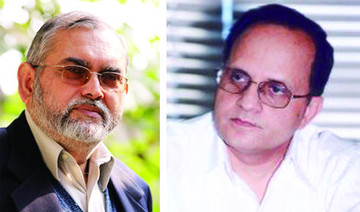WASHINGTON: US Secretary of State Antony Blinken and his British counterpart David Lammy arrived in Kyiv on Wednesday for a series of meetings with senior government officials including Ukrainian President Volodymyr Zelenskiy.
Blinken and Lammy pulled into Kyiv's main train station ahead of a busy schedule that comes at a crucial time in the war, with Kyiv urging its allies to allow it to strike deeper into Russian territory with Western weapons.
"I think it’s a critical moment for Ukraine in the midst of what is an intense fall fighting season with Russia continuing to escalate its aggression," Blinken said in London at a news conference with Lammy on Tuesday.
“I think it’s a critical moment for Ukraine in the midst of what is an intense fall fighting season with Russia continuing to escalate its aggression,” Blinken said in London at a news conference with Lammy.
Zelensky has been pleading for Western countries to supply longer-range missiles and to lift restrictions on using them to hit targets such as military airfields inside Russia.
On the battlefield more than 2-1/2 years since the invasion, Ukrainian forces are being stretched by a better armed and more numerous foe, as they try to fend off creeping Russian gains in the east where Moscow is focusing its attacks.
In a bid to seize back some of the initiative and divert Russian forces, Kyiv sent troops into Russia on an audacious large-scale cross-border incursion last month, but Moscow’s troops have continued to inch forward in the east.
The visit also comes a day after Blinken in London said Russia has received ballistic missiles from Iran and will likely use them in Ukraine within weeks, warning that cooperation between Moscow and Tehran threatens wider European security.
The deepening military cooperation between Iran and Russia is a threat for all of Europe, Blinken said, and added that Washington had privately warned Iran that providing ballistic missiles to Russia would be “a dramatic escalation.” The US issued sanctions on Iran later on Tuesday over the transfer.
Blinken declined to say whether Washington will allow Ukraine to use long-range weapons deep inside Russia but said multiple factors went into the consideration of this decision rather than just looking at it as a weapons system.
“It’s not just the system itself that counts. You have to ask: Can the Ukrainians effectively use it, and sometimes that requires significant training, which we’ve done. Do they have the ability to maintain it?,” Blinken said.
Zelensky has long pushed back against allies who have supplied long-range weapons but told Kyiv they cannot use them deep inside Russia for fear of instigating a direct conflict between the West and Russia’s President Vladimir Putin.
Thousands of civilians have died in the war, which Russia started with a full-scale invasion on Ukraine in February 2022. Millions of Ukrainians have also been displaced, while their cities and villages have become piles of rubble.
Russia has escalated its drone and missile attacks on Ukraine in recent weeks, while Ukraine has also sent hundreds of long-range attack drones deep into Russian territory.
Later this month, Zelensky travels to the United States and will present a plan to President Joe Biden and his two potential successors in Novembers election that he hopes will bring the end of the war closer.
Blinken, Lammy arrive in Kyiv for talks with Ukraine’s leaders
https://arab.news/yhkcn
Blinken, Lammy arrive in Kyiv for talks with Ukraine’s leaders

- The top US diplomat, who is traveling to Ukraine alongside Britain’s Foreign Secretary David Lammy, said he will use his visit to hear directly from Ukrainian President Volodymyr Zelensky




























